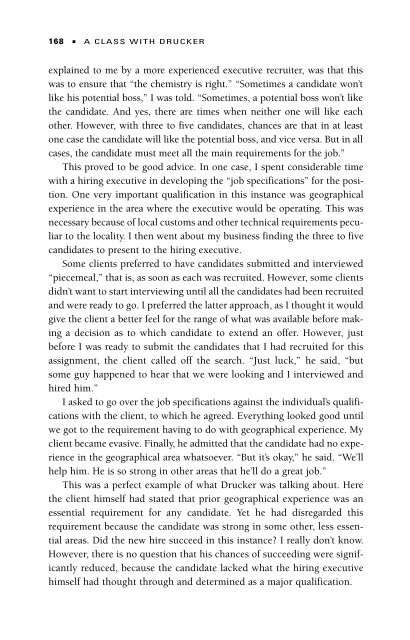A Class with Drucker - Headway | Work on yourself
A Class with Drucker - Headway | Work on yourself
A Class with Drucker - Headway | Work on yourself
Create successful ePaper yourself
Turn your PDF publications into a flip-book with our unique Google optimized e-Paper software.
168 ■ A CLASS WITH DRUCKER<br />
explained to me by a more experienced executive recruiter, was that this<br />
was to ensure that “the chemistry is right.” “Sometimes a candidate w<strong>on</strong>’t<br />
like his potential boss,” I was told. “Sometimes, a potential boss w<strong>on</strong>’t like<br />
the candidate. And yes, there are times when neither <strong>on</strong>e will like each<br />
other. However, <str<strong>on</strong>g>with</str<strong>on</strong>g> three to five candidates, chances are that in at least<br />
<strong>on</strong>e case the candidate will like the potential boss, and vice versa. But in all<br />
cases, the candidate must meet all the main requirements for the job.”<br />
This proved to be good advice. In <strong>on</strong>e case, I spent c<strong>on</strong>siderable time<br />
<str<strong>on</strong>g>with</str<strong>on</strong>g> a hiring executive in developing the “job specificati<strong>on</strong>s” for the positi<strong>on</strong>.<br />
One very important qualificati<strong>on</strong> in this instance was geographical<br />
experience in the area where the executive would be operating. This was<br />
necessary because of local customs and other technical requirements peculiar<br />
to the locality. I then went about my business finding the three to five<br />
candidates to present to the hiring executive.<br />
Some clients preferred to have candidates submitted and interviewed<br />
“piecemeal,” that is, as so<strong>on</strong> as each was recruited. However, some clients<br />
didn’t want to start interviewing until all the candidates had been recruited<br />
and were ready to go. I preferred the latter approach, as I thought it would<br />
give the client a better feel for the range of what was available before making<br />
a decisi<strong>on</strong> as to which candidate to extend an offer. However, just<br />
before I was ready to submit the candidates that I had recruited for this<br />
assignment, the client called off the search. “Just luck,” he said, “but<br />
some guy happened to hear that we were looking and I interviewed and<br />
hired him.”<br />
I asked to go over the job specificati<strong>on</strong>s against the individual’s qualificati<strong>on</strong>s<br />
<str<strong>on</strong>g>with</str<strong>on</strong>g> the client, to which he agreed. Everything looked good until<br />
we got to the requirement having to do <str<strong>on</strong>g>with</str<strong>on</strong>g> geographical experience. My<br />
client became evasive. Finally, he admitted that the candidate had no experience<br />
in the geographical area whatsoever. “But it’s okay,” he said. “We’ll<br />
help him. He is so str<strong>on</strong>g in other areas that he’ll do a great job.”<br />
This was a perfect example of what <str<strong>on</strong>g>Drucker</str<strong>on</strong>g> was talking about. Here<br />
the client himself had stated that prior geographical experience was an<br />
essential requirement for any candidate. Yet he had disregarded this<br />
requirement because the candidate was str<strong>on</strong>g in some other, less essential<br />
areas. Did the new hire succeed in this instance? I really d<strong>on</strong>’t know.<br />
However, there is no questi<strong>on</strong> that his chances of succeeding were significantly<br />
reduced, because the candidate lacked what the hiring executive<br />
himself had thought through and determined as a major qualificati<strong>on</strong>.


